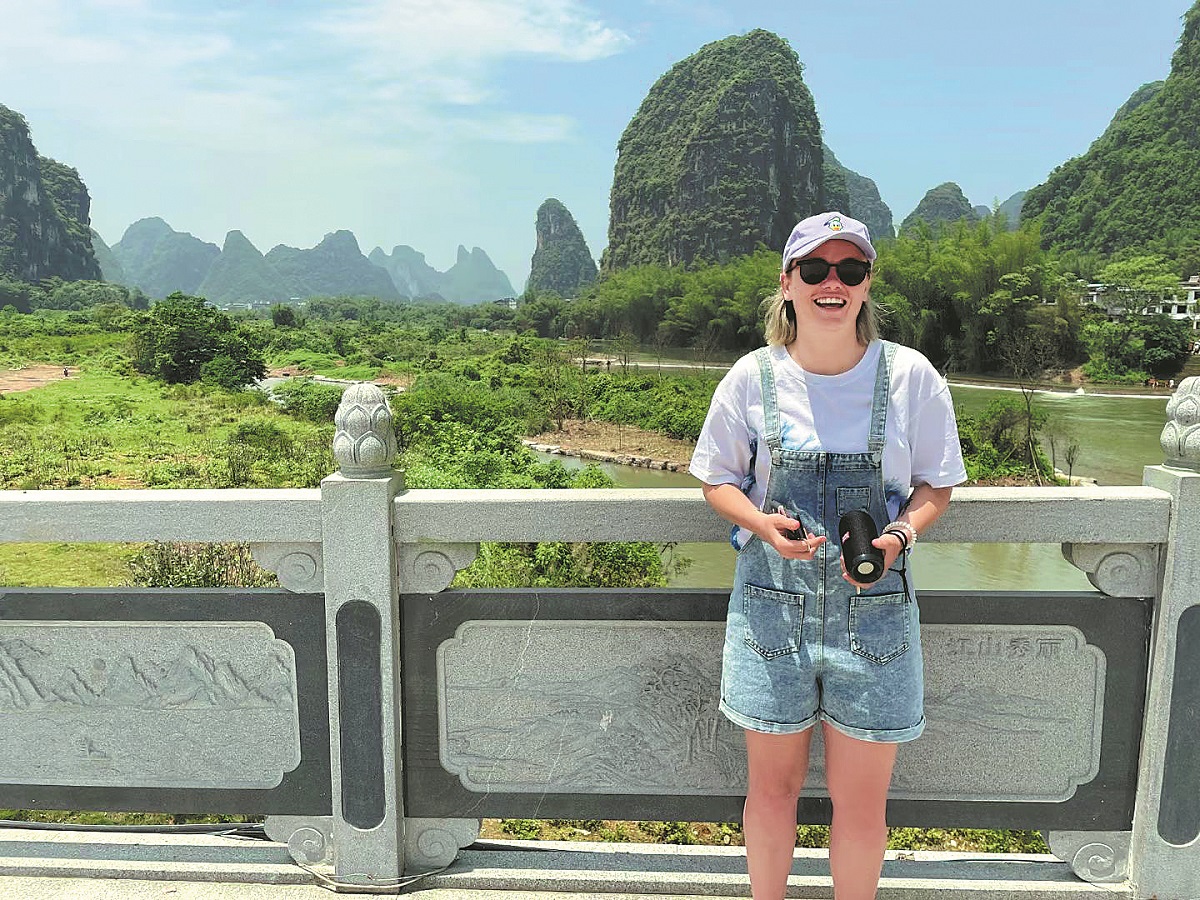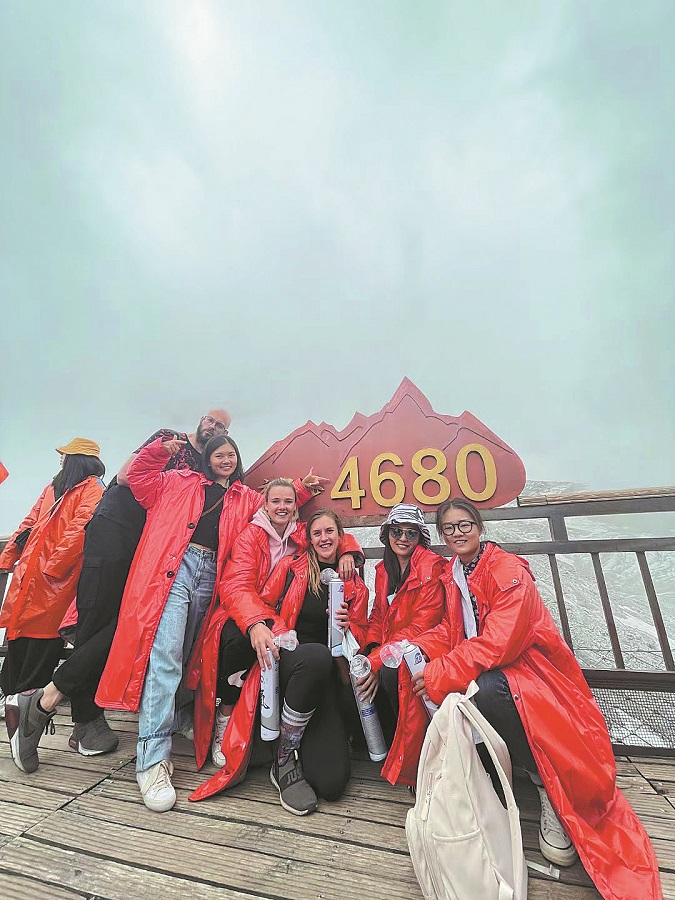Vloggers offer reality check on biased coverage of China

Sitting in Suvarnabhumi International Airport in Bangkok, Reanne Dridge could hardly hide her excitement while she filmed a selfie with her husband, Benjamin, as the couple prepared to fly to China.
"I'm excited, but very, very nervous," she said.
Although China had been on their travel bucket list for a long time, the British couple appeared to have some reservations. They had no idea what to expect, even with their extensive experience as full-time travel vloggers running the On Tour with Dridgers channel for three years.
Friends who had been to China had told them they would have a pleasant stay. But some Western media organizations' portrayal of the country in an unrelentingly negative light had left the couple feeling apprehensive.
"We heard a lot of propaganda from the Western media. But we just did not see or experience it. Maybe the Chinese mainland is different? We're not the sort of people who can be brainwashed into believing something. So, we flew to the historic capital city — Beijing," they said.
After four days of exploring the capital, they said they were "absolutely blown away" by their first impressions of China. Personal safety was no problem, and Beijing people were the "kindest" they had met on their travels and willing to offer help, despite the language barrier. The well-developed public transportation system, the rich culture, the diverse cuisine, and a multitude of other things also impressed them.
Reanne said the experience was"100 percent not like" what she thought it would be like.
China's visa-friendly policies have attracted a large number of travel vloggers this year, who knew little about the country before they arrived. However, most of them have had genuinely enjoyable experiences, prompting them to be critical of biased Western media coverage of China.
"More eyes can only be a good thing," said the Dridges.
"I honestly think that travel vloggers are doing a great job spreading the truth about China. You have to experience it, don't listen to the news. As we've said all the time, come out here, experience it, and then you'll understand."

Negative narratives
A report published in January this year, which examined British media coverage of China between 2020 and 2023, found that negative framing and tone dominated stories. The report was based on analysis of 1,000 articles published by The Telegraph, The Guardian, the BBC, the Financial Times and The Economist between 2020 and 2023.
Tim Summers, the author of the study and an associate professor at the Chinese University of Hong Kong, said this negative coverage will come as no surprise to many readers of the report. He added the phenomenon had been observed "for some time", and is reflected in other academic research on Western media representation of China.
An in-depth look at the articles suggested that politics was a strong theme throughout, and a political lens was often used to frame "less reported" social, economic, and cultural issues.
Political messaging was often infused into stories that were not related to politics, and problems occurring in the country were regularly attributed to its political system, even though these problems could have other causes, Summers said.
"What seems to be happening is that more negative issues are selected for greater coverage … rather than setting out to deliver a balanced and accurate picture of what China is like," he pointed out. Such biased framing of reports is not as commonly seen in reporting on countries that are considered friends or allies of the UK, he added.
Summers said based on his own experience of China, "there is much more to China than politics, and there are many positive developments to report alongside the criticism."
The "oversimplification" of stories about China leaves no room for discussing alternative perspectives in policy debates, and distorts perceptions of China and of its people, the report concluded.

Fresh perspective
Jannelize Bessenger, a part-time vlogger from South Africa who has been living in China for more than five years, is aware of the inaccurate depiction of the country.
She said before she came to China there was "not one positive thing" she knew about the country from media reports.
"It was just scary stuff all the time. It (the media) seldom reported about food, and even if it did, it was always about the weird food in the weird markets," she recalled.
The negative reports raised unnecessary fears for both her and her family, and planted "strange "ideas in her head such as sushi being the only food she could eat in China.
"That just explains how much the West knows about China," said the South African.
"If you want to know about China, you have to do research. But for people who aren't really interested, they just hear things on the news, and that was me and my family."
The misconceptions inspired Bessenger to start a YouTube channel documenting her daily life in China.
She is also glad to see more and more foreigners exploring the real China firsthand.
"They are exactly like me," she said. "They came to China with not that much knowledge. Why would people make those videos if China is really a bad place?"
On the resurgence of China's inbound travel, Summers, the academic, said while personal experiences can vary, there is no substitute for seeing how things are on the ground.
However, even honest accounts by vloggers can result in accusations they were paid by the government to speak positively about China.
"We get asked this on almost every single video, and it gets a little bit boring," said Benjamin Dridge.
Another British couple Taz and Libby, whose YouTube channel is called Sun Kissed Bucket List, said their motives are rarely questioned when they post videos about other countries.
"We've probably not experienced this before," they said in a video, in response to accusations of bias. "Why would anyone want to pay anyone when, literally, the doors have been opened to over 50 countries with visa-friendly policies? It is open for everyone to come and see things for themselves."
They added that China can't make it any easier for tourists to visit the country. "If you have any concerns, travel to the country, see things for yourself, and see what's happening."

Door flung open
Peng Han, chief analyst at Travel Daily, a Chinese tourism media company, said the visa-friendly policies showcase China's determination to open its doors wider to the world.
"If we look at the timeline, we can notice that China's visa-friendly policies have been extended for longer, and expanded to more countries. Step by step, China is fulfilling its opening-up commitment, forming a clear trend for tourism industry insiders at home and abroad to examine the market outlook. I personally believe that China's door will only open wider," he said.
Since last year, China has taken steps to implement trial visa-free policies for travelers from dozens of countries, including European nations such as France and Germany.
People from the approved countries and regions holding ordinary passports are allowed to stay on the Chinese mainland for up to 15 days for purposes of transit, tourism, business trips or family trips. China has also extended its 72- and 144-hour visa-free transit policy to 54 countries, including the United States, Canada and the UK.
Wang Xuan, senior lecturer in marketing and revenue management at the University of Surrey in Guildford, England, said she is pleased to see the targeted measures to facilitate foreign visitors' stay in China, including diversifying payment methods, streamlining hotel registrations, and enhancing multilingual services at tourist spots.
While these measures are a step in the right direction, challenges remain.
"I think China does have a hospitality culture, but the real issue is how we can better place ourselves in the shoes of the visitors," Wang said. "The next step is to better engage governments at all levels and service providers to address the hurdles."
Peng hopes that the policy support and its implementation stay on course. Many of the specifics should be left to the service providers to manage, he said, adding the market should be allowed to play its role.
"If there is a profit to be made, businesses will naturally step in to meet these needs, improving foreign tourists' experiences with language services, mobile communication, and payments," he said.
Peng is assessing the prospects of the Chinese inbound tourism market by tracking investment in the industry.
Well-known international hotel chains like the InterContinental, Marriott, and Hilton all have big plans to expand in China in 2024, he said.
"Businesses are all driven by profit. If the market does not have potential, they wouldn't be increasing their investments. So, it shows that the hotel groups are optimistic about the Chinese tourism market, including inbound tourism, as many foreign tourists prefer to stay at familiar hotel brands when they visit China," Peng said.
"Opportunities vary across different sectors," he added. "In the long run, it's no surprise that inbound tourism in China is on the rise."
Eager to return
The Dridges are preparing to return to China to immerse themselves more in the country.
"We just want to spend as much time as possible discovering China. Obviously, China is going to be a massive part of our channel over the next three years," they said.
The Sun Kissed Bucket List's Taz and Libby, who have visited China three times since last year and traveled to 10 cities, are also planning a fourth trip.
"The biggest lesson that travel has taught us is to make your own opinions and make your own views," the couple said in a video summing up their discoveries in China.
"Don't believe everything that you hear or read in the media because that could be someone's point of view. That view could be biased, and that view could be skewed.
"We are not saying anywhere is perfect. Everywhere has its imperfections and shortcomings, and we are not blind to that. What we are trying to say is that you should form your own understanding and have your own perceptions of things. Don't be so easily led," they added.
Bessenger is trying to focus less on her full-time work and more on travel.
"If I can just change people's minds a little bit, that could be a good thing," she said. "So, it is important for me to go outside more, and show them the true experiences I have when the camera is on."
When asked for one piece of advice she would give to someone paying close attention to the country she said, "Just come to China and see for yourself first."
